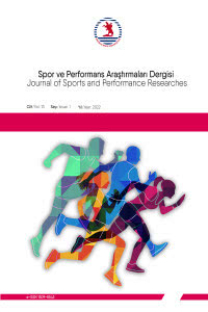NEOLİBERAL DÖNEMDE ULUSLARARASI FUTBOLCU HAREKETLİLİĞİ
Yirminci yüzyılın son çeyreğinde futbolun ekonomik küreselleşmesi hızlanmıştır. Futbolun neoliberal dönemi olarak adlandırılabilecek bu süreçte futbolun ticari yönü artmış, televizyon yayın haklarının etkisiyle futbol ekonomisi büyümüş, uluslararası yatırımlar artmış ve kulüpler birer markaya dönüşmüştür. Bu neoliberal dönemin en önemli unsurlarından biri de emek hareketliliğinin önündeki engellerin kaldırılması olmuştur. Bosman Kararları başta olmak üzere bu engellerin kaldırılması neoliberal küreselleşme sürecinde nitelikli emeğin hareketliliğini tartışılır hale getirmiştir. Bu çalışmadaki amaç da neoliberal dönemde futbol ekonomisinde yaşanan değişimi açıklamak ve emek piyasasındaki serbestleşmenin uluslararası futbolcu hareketliliğini nasıl etkilediğini ortaya koymaktır. Futbolcu hareketliliğindeki değişimi göstermek için ise erkek milli takım kadroları incelenmiştir. Verilere göre serbestleşme sonrası, seçkin futbolcular, Avrupa'nın beş büyük ligi olan İngiltere, İspanya, Almanya, İtalya ve Fransa'ya yönelmiştir. Bu hareketlilik, neoliberal küreselleşme ve tekelleşme ilişkisini futbol ekonomisinde de tartışma konusu haline getirmektedir.
Anahtar Kelimeler:
Bosman, emek, futbol, küreselleşme
INTERNATIONAL FOOTBALL MOBILITY IN NEOLİBERAL ERA
The economic globalization of football accelerated in the last quarter of the twentieth century. In this process which can be called as the neoliberal period of football, commercial aspect of football has increased, football economy has grown due to the effects of television broadcasting rights, international investments have increased and the clubs have become a brand. One of the most important elements of this neoliberal era was the removal of obstacles in front of labour mobility. The abolition of these obstacles, especially Bosman Rules, made the mobility of skilled labor questionable in the process of neoliberal globalization. The aim of this study is to explain the change in football economy in the neoliberal period and to determine how the liberalization of the labour market affected international football mobility. In order to show the change of international football mobility, male national team squads were examined. According to the data, after the liberalization, the elite players have migrated to the five major leagues in Europe; England, Spain, Germany, Italy and France. This mobility makes the relationship between neoliberal globalization and monopoly a debate topic in the football economy.
Keywords:
Bosman, football, globalization, labour,
___
- Milanovic B. The world at play: soccer takes on globalization, Yale Global Online, 2010 Haziran [cited 2018 Mayıs 12]. https://yaleglobal.yale.edu/content/world-play-soccer-takes-globalization.
- King A. After the crunch: a new era for the beautiful game in Europe?, Soccer & Society, 2010; 11 (6): 880-891.
- Giulianotti R, Robertson R. Globalization & Football. California: SAGE Publications; 2009.
- Dubal S. The neoliberalization of football: rethinking neoliberalism through the commercialization of the beautiful game, International Review for the Sociology of Sport, 2010; 45 (2): 123-146.
- Goldblatt D. Ball is round: a global history of soccer. New York: Riverhead Books; 2006.
- Giulianotti R. Football: a sociology of the global game. Cambridge: Polity Press; 1999.
- Ritzer G. Küresel dünya. (Çev. Melih Pekdemir). İstanbul: Ayrıntı Yayınları; 2011.
- Cleland J. A sociology of football in a global context. New York: Routledge; 2015.
- Lanfranchi P, Taylor M. Moving with the ball: the migration of professional footballers. Oxford: Berg; 2001.
- Kesenne S. The Bosman case and European football, Wladimir A, Stefan S, editors, Handbook on the economics of sport, Northampton: Edward Elgar; 2006.
- Andreff W. The economic effects of 'muscle drain' in sport, Birkbeck Research Paper Series, 2008; 2 (2): 9-31.
- Giulianotti R, Robertson R. Mapping the global football field: a sociological model of transnational forces within the world game, The British Journal of Sociology, 2012; 63 (2): 216-240.
- UEFA. Financial fair play: all you need to know. [cited 2018 May 11]. https://www.uefa.com/community/news/newsid=2064391.html
- University of Leicester Centre for the Sociology of Sport. The 'New' Football Economics. [cited 2018 Nov 17]. http://www.furd.org/resources/fs10.pdf
- Milanovic B. Globalization and goals: does soccer show the way? , Review of International Political Economy, 2005; 12 (5): 829-850.
- Gardiner S, Welch R. Nationality and protectionism in football: why are FIFA's '6+5 rule' and UEFA's 'home-grown player rule' on the agenda?, Soccer & Society, 2011; 12 (6): 774-787.
- UEFA. The european club footballing landcape, club licensing benchmarking report financial year 2015. [cited 2018 May 11]. https://it.uefa.com/MultimediaFiles/Download/Tech/uefaorg/General/02/42/27/91/2422791_DOWNLOAD.pdf
- UEFA. Protecting of young players. [cited 2018 May 12]. http://www.uefa.com/news/newsid=943393.html
- CIES Football Observatory [homepage on the Internet] Digital Atlas 2017. http://www.football-observatory.com/
- Szymanski S. On the ball, Finance & Development [serial on the Internet]. 2014 March [cited 2018 May 12]; 51 (1). https://www.imf.org/external/pubs/ft/fandd/2014/03/szymanski.htm
- ISSN: 1309-5110
- Yayın Aralığı: Yılda 3 Sayı
- Başlangıç: 2010
- Yayıncı: Ondokuz Mayıs Üniversitesi Yaşar Doğu Spor Bilimleri Fakültesi
Sayıdaki Diğer Makaleler
FARKLI DİZ AÇILARI VE SÜRELERDE YAPTIRILAN STATİK GERMENİN, SIÇRAMA PERFORMANSI ÜZERİNE AKUT ETKİSİ
Gonca İNCE, A. Serhan YILDIRIM
NEOLİBERAL DÖNEMDE ULUSLARARASI FUTBOLCU HAREKETLİLİĞİ
ÇOCUKLARDA MOTOR BECERİ İLE FUTBOLA ÖZGÜ TEKNİK BECERİLER ARASINDAKİ İLİŞKİNİN İNCELENMESİ
Zait Burak AKTUĞ, Rüçhan İRİ, Çağrı ÇELENK
GİYİLEBİLİR BİOELEKTRİK İMPEDANS ÖLÇÜM CİHAZININ GEÇERLİLİK VE GÜVENİRLİĞİNİN ARAŞTIRILMASI
Egemen MANCI, Hikmet GÜMÜŞ, B. Muammer KAYATEKİN
Metin YÜCEANT, Hüseyin ÜNLÜ, Orhan Fatih BALANLI
Çağrı Hamdi ERDOĞAN, Ziya BAHADIR
KAFEİN TAKVİYESİNİN KISA SÜRELİ YÜKSEK YOĞUNLUKLU EGZERSİZE ETKİSİ: KAFEİN ALIM ZAMANI
